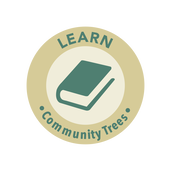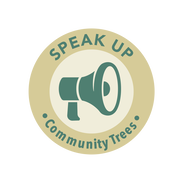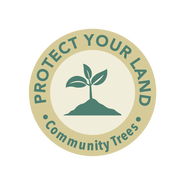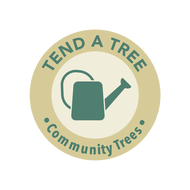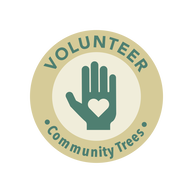By Summer Roberts, Community Forester
In response to concerns voiced by residents in the 2021 Resource Assessment Survey, specifically land use (zoning and pace of development) and fragmentation of forests, the WCCD developed the Community Trees Pilot Project. The project goals included: 1) advertise the benefits of trees, 2) improve residents’ understanding of how local ordinances impact trees and land use, 3) provide residents, local officials, and staff with options and ideas for preserving and increasing trees, and 4) encourage participation in local government where residents can most readily influence decisions regarding land use.
The WCCD was awarded almost $15,000 from MDNR’s Urban and Community Forestry grant to pilot a project examining trees in four municipalities: Bridgewater Township, Sharon Township, Ypsilanti Township, and the City of Ypsilanti. The 18-month long project involved a six-step process: 1) developing the project and securing grant funding, 2) coordinating with local officials and staff in each pilot municipality, 3) surveying community members, 4) conducting research and analysis, 5) creating public handouts and educational material, and 6) sharing project results and soliciting feedback. For Step 4, WCCD was able to enlist U-M Graduate students with appropriate skill sets to perform in-depth reviews of local ordinances and master plan information pertaining to trees and open space as well as performing GIS analyses exploring where trees could be preserved or planted to address community goals. For Step 5, WCCD hired a graphic designer to create accessible public educational materials. For Step 6, WCCD held community meetings in October and November to share the project deliverables, encourage resident engagement, and learn how the project could be improved. Educational materials and additional information can be found online at washtenawcd.org/communitytrees.
Overall, the Community Trees Pilot Project has allowed WCCD to reach underserved communities in Washtenaw County, identify significant differences between how rural and urban local governments operate and the desires of their community members, and understand more fully the barriers to tree protection and planting faced by residents and municipalities in our County. Repeated contact and meaningful conversations with elected officials and staff have led to creative solutions to make tangible impacts on the ground and set in motion long-term engagement in these communities. The pilot project has also provided a pathway to expand the program countywide depending on funding and staff capacity.
Are you wondering what you can do in your community? Even if you don’t live in one of the Pilot Project municipalities, you can still take action to ensure that natural resources are protected, and land is wisely used in your community. Pick one (or more!) of the options below that work for you and start today!
The WCCD was awarded almost $15,000 from MDNR’s Urban and Community Forestry grant to pilot a project examining trees in four municipalities: Bridgewater Township, Sharon Township, Ypsilanti Township, and the City of Ypsilanti. The 18-month long project involved a six-step process: 1) developing the project and securing grant funding, 2) coordinating with local officials and staff in each pilot municipality, 3) surveying community members, 4) conducting research and analysis, 5) creating public handouts and educational material, and 6) sharing project results and soliciting feedback. For Step 4, WCCD was able to enlist U-M Graduate students with appropriate skill sets to perform in-depth reviews of local ordinances and master plan information pertaining to trees and open space as well as performing GIS analyses exploring where trees could be preserved or planted to address community goals. For Step 5, WCCD hired a graphic designer to create accessible public educational materials. For Step 6, WCCD held community meetings in October and November to share the project deliverables, encourage resident engagement, and learn how the project could be improved. Educational materials and additional information can be found online at washtenawcd.org/communitytrees.
Overall, the Community Trees Pilot Project has allowed WCCD to reach underserved communities in Washtenaw County, identify significant differences between how rural and urban local governments operate and the desires of their community members, and understand more fully the barriers to tree protection and planting faced by residents and municipalities in our County. Repeated contact and meaningful conversations with elected officials and staff have led to creative solutions to make tangible impacts on the ground and set in motion long-term engagement in these communities. The pilot project has also provided a pathway to expand the program countywide depending on funding and staff capacity.
Are you wondering what you can do in your community? Even if you don’t live in one of the Pilot Project municipalities, you can still take action to ensure that natural resources are protected, and land is wisely used in your community. Pick one (or more!) of the options below that work for you and start today!
|
Learn more about your municipality’s local laws and zoning by calling or visiting your township, city or village’s website. Staff and elected officials care about your community – just like you – and they want to hear from residents! Just remember, planning for future scenarios is easier than challenging a development that adheres to the current policy and rules. Find a model municipality and use their policy as inspiration! Once you know the current laws and regulations, you can use a model municipality’s ordinances and zoning regulations to propose changes in your community. Speak up and make your voice and vision heard by attending meetings, rallying neighbors, and addressing your municipality’s boards and commissions. If you’re a landowner with natural features (forest, wetlands, prairie, etc.) or a working farm, consider protecting your land for current and future generations. Most of our natural resources are privately owned and loss of natural areas generally occurs when land changes ownership. There are multiple pathways for land protection, including purchasing land outright, conservation easements, and donations. Contact the WCCD for more info. Budget some funds to tend a tree in your yard or, with permission from your municipality or the Washtenaw County Road Commission, in the public ROW. Trees cost resources – time, money, effort – to plant and maintain, but if “right tree, right place” principles are followed, they are a great investment. Want to calculate YOUR tree’s impact on carbon sequestration, air pollution, and stormwater impacts? Check out the FREE “My Tree” i-tree tool! Stay up to date on volunteer opportunities by connecting with conservation organizations that work in your local area. Need some ideas? Sign-up for the WCCD’s monthly e-newsletter! Also check out ReLeaf Michigan for tree planting events and Washtenaw County Parks and Recreation for stewardship and monitoring activities at parks and preserves. If your municipality has parks or preserves, call or visit their website to find how you might be able to help! |

